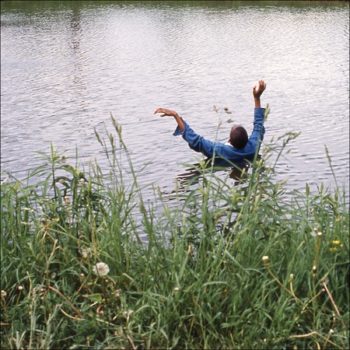“A masterpiece…There’s a uniquely complex freshness to the Wild Up recording. It opens with more exuberant energy than the other versions. Beefy saxophones and horns add richness, and with denser percussion, the overall effect is of a jungle or aviary, a swirling bustle — but in a dewy, pastoral key… After solemn, almost medieval harmonies, the ending is a glittering ice storm of bells.”
— The New York Times
“Instantly recognizable… an immersive, jazz-inflected chamber piece, which slowly builds into a textured soundscape of interwoven strings, horns, piano, and synthesizer.”
— Vogue
“singularly jubilant…Wild Up’s new rendition of Femenine takes a page from Eastman’s personal playbook: It’s exuberant, a bit in your face, sometimes capricious, and always surprising.”
— NPR Music
Julius Eastman Vol. 1: Femenine is the opening entry in our multi-volume anthology celebrating Eastman, the late composer whose amalgamated musical vision was repeatedly dismissed during its day, but is now being unearthed to critical acclaim.
Femenine is the epitome of Eastman’s longform “organic music” — where phrases live inside of phrases, multiple layers ebbing and flowing with the passage of time. Within Femenine, Eastman, whose music The New Yorker hailed as “brazen and brilliant,” evolves material based on a two-note, 13-beat “prime” melody — a cosmic clamoring of bells. Simultaneously static and active, Femenine lulls listeners into musical reverie.
Eastman was young, gay, and Black at a time when it was even more difficult to be young, gay, and Black. He swerved through academia, discos, Europe, Carnegie Hall, and the downtown experimental music scene. And in 1990, at age 49, Eastman died in Buffalo, New York, less than a decade after the New York City Sheriff’s Department threw most of his scores, belongings, and ephemera into the East Village snow. In our unique 70-minute interpretation of Eastman’s open score, we’re challenged to work in dialogue with the composer’s own creative impulses; channeling his individualistic spirit, augmenting Femenine with strategically placed solos—individual cantor-like proclamations. The recorded performance reflects a blend of strict adherence to Eastman’s specific instructions with an embrace of individual and collective decision-making within the ensemble, a continuous three-way conversation between Eastman, our individual members, and the group as a whole.
This album represents a departure for New Amsterdam Records, which until this point has exclusively released new music by active, living composers. Eastman is a special case, a composer whose music shines like a retroactive beacon to today’s musical creators. Any term used to characterize today’s musical landscape — “genre fluid” or the like — was anticipated by Eastman decades before; yet he was punished for being ahead of his time, both in the treatment of his music and, tragically, his person. Eastman’s music flowed freely from — and through — his myriad influences, and was terribly served by the musical infrastructure of his day. (At the time of his death, it took some eight months for a newspaper — any newspaper — to run his obituary). It makes sense, then, for Femenine to arrive on New Amsterdam Records — a sort of loving backwards embrace of a musical forefather to 21st century composers.
Eastman sometimes gifted copies of his musical scores. Now, over three decades since his death, his work is being regifted by those whose lives he touched. For us, to play Eastman’s music is to feel we are in, of, and visiting his world at the same time. Though the band worked with scrupulous care to realize this project, part of the joy of performing it is accepting that Julius Eastman’s precise intentions for this elusive score will always remain something of a mystery — just a little out of reach. Still, in the frenzied ecstasy of performing his work, we feel a little more alive, a little more connected, a little more free, and by embarking on this anthology, we endeavor to carry this freedom forward.
Included on NPR Music’s 26 Favorite Albums of 2021 (So Far)
Reviews
Credits
Wild Up:
richard valitutto, piano / bells / leader
Seth Parker Woods, cello / leader
Sidney Hopson, vibraphone / prime
Andrew Tholl, violin / bells
Mona Tian, violin / bells
Linnea Powell, viola / bells
Derek Stein, cello / bells
Jiji, guitar
Odeya Nini, voice
Jodie Landau, vibraphone / marimba / synth / voice / bells
Lewis Pesacov, bells
Jonah Levy, flugelhorn
Allen Fogle, horn
Shelley Washington, baritone saxophone / alto saxophone / bells
Erin Rogers, baritone saxophone / alto saxophone
Brian Walsh, tenor saxophone
Marta Tiesenga, baritone saxophone
Isabel Lepanto Gleicher, flutes / piccolo / bells
Erin McKibben, flutes / piccolo / bells
Christopher Rountree, music director / bells
Solos in order of appearance: Sidney Hopson, vibraphone (prime); richard valitutto, piano; Marta Tiesenga, baritone saxophone; Seth Parker Woods, cello; Jonah Levy, flugelhorn; Odeya Nini, voice; Allen Fogle, horn; Brian Walsh, tenor saxophone; Jodie Landau, synth and voice
Produced, recorded and mixed by Lewis Pesacov
Engineered by Clint Welander and Lewis Pesacov
Assistant engineer Nate Haessly
Recorded at Sunset Sound Recorders
Mixed at Ahata Sound
Mastered by Reuben Cohen at Lurssen Mastering, Los Angeles, CA
Album Designer: Andrea Hyde
Photo: Julius Eastman in the Water © 1975, 2017 Chris Rusiniak, (published in Performing the Music of Julius Eastman) cropped for record dimensions
Music: Julius Eastman: Femenine © G. Schimer 2018






